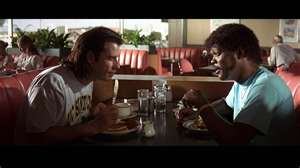Pulp Fiction’s Themes Re-visited 
If I had a dime for every time I’ve debated the meaning of that damn briefcase in Pulp Fiction I could buy a round of milkshakes from Jack Rabbit Slim’s. It’s the mark of a film’s greatness that 18 years later people are still talking about it. My favorite filmgeek podcast, Filmspotting, recently explored Pulp Fiction’s legacy and re-visited it’s deeper meanings (or lack there of).
Coincidentally, I’ve been reading All Things Shining by philosophers Hubert Dreyfus and Sean Kelley which briefly touches on the existential themes in Pulp Fiction, too. So, film/philosophy geek that I am, I had to revisit Tarantino’s masterpiece in search of deeper meanings. Every frame of that film is bursting with style, but, as Adam and Josh from Filmspotting ask, does Pulp have any substance? Is there any ‘there’ there?
Dreyfus and Kelley argue there is. They call the ‘hand cannon’ scene a contemporary version of an ‘Odysseus event,’ an incredible experience which forces you to feel either extraordinarily lucky or grateful to a higher power. In Homer’s Odyssey, when a barrage of spearheads miss the mark and Odysseus escapes, he thinks it’s because Athena is looking out for him. When the Jerry-Seinfeld-looking dude charges out of bathroom and unloads point blank on Jules and Vincent, they have irreconcilable interpretations as to what the inexplicably errant shots mean. Take a look: http://youtu.be/anhdphUxNVo
Vincent says they were lucky. Jules says it was divine intervention.
As Dreyfus and Kelly point out, Jules and Odysseus both felt a power outside of themselves had gotten involved. Vincent, of course, doesn’t accept the metaphysics. He’s a Han Solo-style skeptical realist: higher powers don’t exist, and the fact that they’re still alive is a fluke. Nobody’s ‘up there’ pulling the strings.
One event. Two different experiences.
This moment mirrors the modern existential concern with subjective freedom, choices, and responsibility. Jules suddenly sees the world in a new light. He decides to leave the business and walk the earth—an inner transformation evident in the new meaning he finds in his (largely made-up) Ezekiel quote. What was once just some cold-blooded shit to say before he popped a cap becomes a formula for how to see himself and his place in the world. He’s finally connected with the spirit of what he’s been saying and now wants to lead a more authentic life. Vincent, on the other hand, rejects the religious interpretation, scoffs at Jules’ plan, and tries to change the subject.
Take a look: http://youtu.be/YujYTVQ4_S0
The debate ends when Vincent goes to the bathroom and the robbery goes down. Afterward, when Jules and Vincent leave the diner, there’s a sense of accomplishment and finality. The two men exit, the movie ends, and we’re left to wonder if Jules will actually retire and pursue his new path. Thanks to the non-linear structure, though, we know what happens to Vincent at least. Accidentally shooting Marvin in the face and the close call with Mia fail to make an impression. It’s almost comical how Vincent refuses to be spooked by all his ‘bad luck.’ The only thing he really agonizes over is whether to have sex with Mia or not, a debate that happens while he’s in the bathroom and not outside preventing Mia from snorting the heroin. Turns out, Vincent is pretty dense. His fate, of course, is to be gunned down by Butch after…emerging from the bathroom.
Coincidence? Is somebody trying to tell us something? Is there a ‘there’ there?
The scenario prompts some intriguing questions: Is the hyper-stylish Pulp Fiction—a brutal, often sadistic film about the apparent morality of immoral men—actually a deeply spiritual story? Is Vincent’s fate a subtle critique of the agnostic/atheist worldview? Setting metaphysical issues aside, is Taratino rewarding Jules’ existential openness while punishing Vincent for his close-mindedness? It’s almost as if Tarantino is daring me to call Pulp Fiction a religious movie.
After all, if we had absolute insight into how the cosmos works, then there would be no room for faith, and we wouldn’t really be free. The choices that matter—the ones which define our identity and imbue our days with meaning—are always made from behind a veil of uncertainty. There’s an inexorable element of risk. Otherwise, we’d just be taking marching orders. We’d be drones. The miracle/fluke dichotomy dramatizes the rare opportunities life offers: the chance to reassess who we are, take a long, hard look in the mirror, and ask, ‘Is something up there sending me a message? Is it time to consider another path?’ That’s the question Vincent should’ve asked himself. Jules asks these questions and gets a clear response.
One event. Two experiences. Two divergent paths.
Of course, you could also say that if Jules hadn’t walked away, he would’ve had Vincent’s back and Butch wouldn’t have killed him. Again, Tarantino leaves it open to interpretation because life itself is an open text, and we have to connect the dots. We may never see the big picture, but we can learn a lot about ourselves from the connections we try to make.

